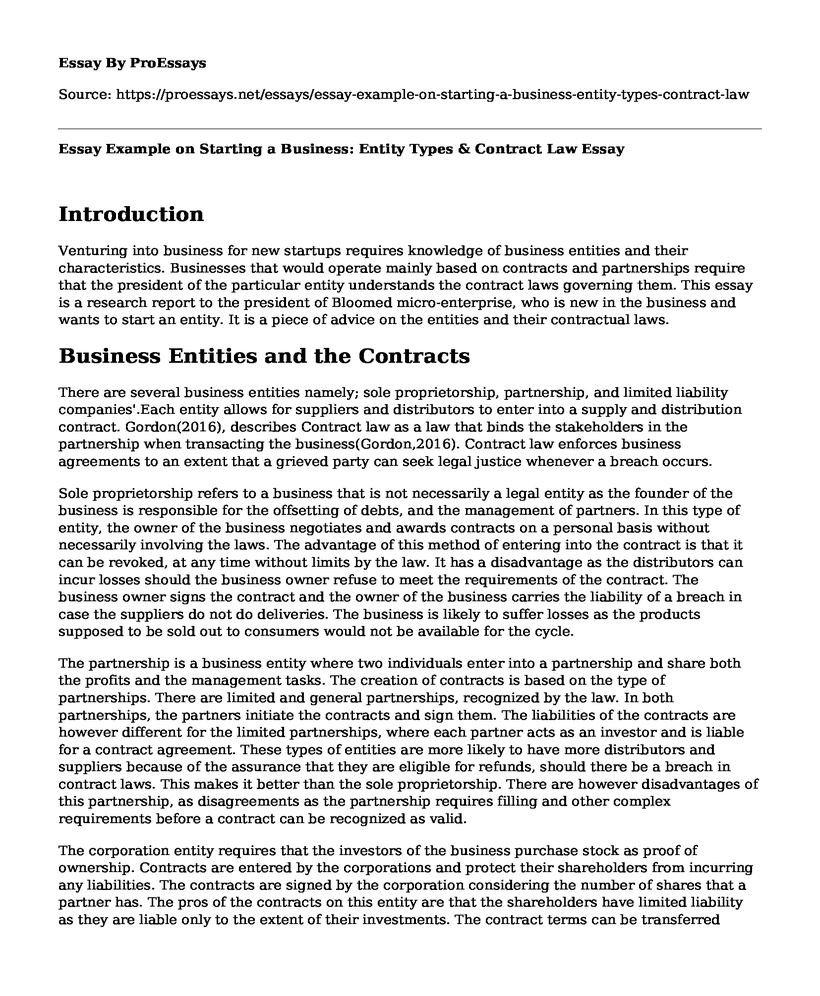Introduction
Venturing into business for new startups requires knowledge of business entities and their characteristics. Businesses that would operate mainly based on contracts and partnerships require that the president of the particular entity understands the contract laws governing them. This essay is a research report to the president of Bloomed micro-enterprise, who is new in the business and wants to start an entity. It is a piece of advice on the entities and their contractual laws.
Business Entities and the Contracts
There are several business entities namely; sole proprietorship, partnership, and limited liability companies'.Each entity allows for suppliers and distributors to enter into a supply and distribution contract. Gordon(2016), describes Contract law as a law that binds the stakeholders in the partnership when transacting the business(Gordon,2016). Contract law enforces business agreements to an extent that a grieved party can seek legal justice whenever a breach occurs.
Sole proprietorship refers to a business that is not necessarily a legal entity as the founder of the business is responsible for the offsetting of debts, and the management of partners. In this type of entity, the owner of the business negotiates and awards contracts on a personal basis without necessarily involving the laws. The advantage of this method of entering into the contract is that it can be revoked, at any time without limits by the law. It has a disadvantage as the distributors can incur losses should the business owner refuse to meet the requirements of the contract. The business owner signs the contract and the owner of the business carries the liability of a breach in case the suppliers do not do deliveries. The business is likely to suffer losses as the products supposed to be sold out to consumers would not be available for the cycle.
The partnership is a business entity where two individuals enter into a partnership and share both the profits and the management tasks. The creation of contracts is based on the type of partnerships. There are limited and general partnerships, recognized by the law. In both partnerships, the partners initiate the contracts and sign them. The liabilities of the contracts are however different for the limited partnerships, where each partner acts as an investor and is liable for a contract agreement. These types of entities are more likely to have more distributors and suppliers because of the assurance that they are eligible for refunds, should there be a breach in contract laws. This makes it better than the sole proprietorship. There are however disadvantages of this partnership, as disagreements as the partnership requires filling and other complex requirements before a contract can be recognized as valid.
The corporation entity requires that the investors of the business purchase stock as proof of ownership. Contracts are entered by the corporations and protect their shareholders from incurring any liabilities. The contracts are signed by the corporation considering the number of shares that a partner has. The pros of the contracts on this entity are that the shareholders have limited liability as they are liable only to the extent of their investments. The contract terms can be transferred easily from one person to the other. The disadvantages are that some individuals within the corporation can influence the terms of the contract without the owner knowing it, making it challenging.
The final business entity is almost similar to the corporations but has a structure where the stakeholders enter into contracts by agreeing with a signature underneath the sign by the manager of the corporation. They are however bound to the liabilities of the contracts at the personal levels and are subjects to payment of losses with the corporation excluded. The advantages of this type of entity are that the owner enjoys the privilege of being under a corporation, and at the same time able to manage the contracts and choose partners on their terms. The disadvantages of the contractual agreements in this entity are the high cost of hiring law experts and the taxations that comes with its members which can highly reduce the number of investors and distributors who want to enter into a business contract.
Conclusion
In conclusion, the contact laws are binding and have several advantages and disadvantages in terms of liabilities, and their effects on the owners. Some entities are not suitable for small businesses as they are the terms of contracts complex and requires a lot of paperwork.
Reference
Gordon, J. M. (2016). Understanding Business Entities for Entrepreneurs and Managers. https://generalspace.ggc.edu/handle/10675.3/610733
Cite this page
Essay Example on Starting a Business: Entity Types & Contract Law. (2023, Jun 06). Retrieved from https://proessays.net/essays/essay-example-on-starting-a-business-entity-types-contract-law
If you are the original author of this essay and no longer wish to have it published on the ProEssays website, please click below to request its removal:
- Importance of Culture Contexts and Language in International Mergers and Acquisitions
- Competition in the Hotel Industry Essay Example
- Issues Relating to Foreign Business Operations in South Africa Essay Example
- How the Millennial Traveler is Redefining the Hospitality Industry - Research Paper
- Essay Example on IKEA Facing Human Rights Complaint at The Hague
- Paper Example on Occupational Safety & Health: Ensuring Workplace Wellbeing
- Essay Example on Women On Top: Managerial Strategies in Entrepreneur Sectors







